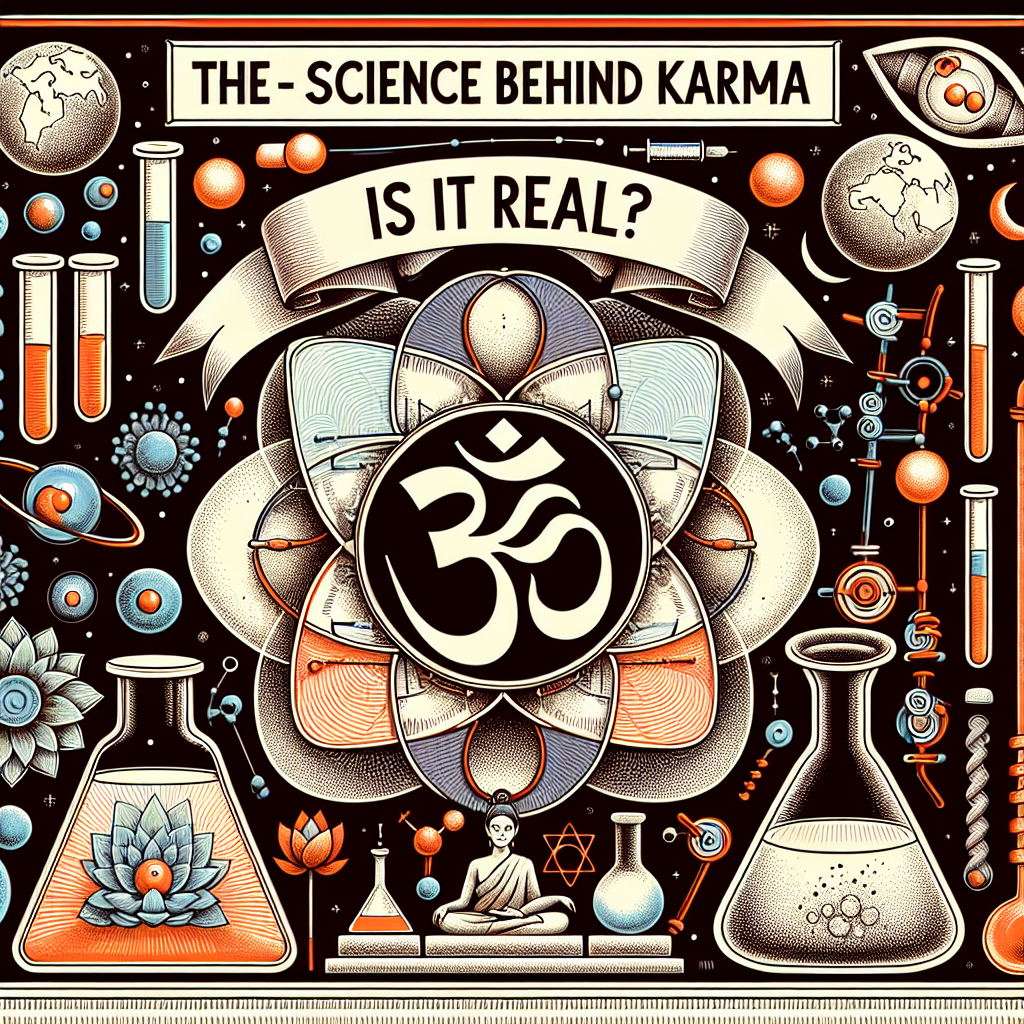In many cultures, the concept of karma is more than just a belief; it is a guiding principle that influences behavior and decision-making. Originating from ancient Indian philosophies, karma encapsulates the idea that actions have consequences, intertwining morality with the universe’s natural law. But is there a scientific foundation to this philosophical doctrine? This article explores the essence of karma, its interpretations across cultures, and the scientific perspectives that may validate or challenge its existence.
Understanding Karma: Definitions and Origins
Karma, derived from the Sanskrit word ‘karmā’, signifies ‘action’ or ‘deed’. In the context of Hinduism, Buddhism, and Jainism, it expresses a moral dimension where actions, whether good or bad, shape an individual’s future in this life and the next. This cosmic law of cause and effect suggests that every action triggers a chain reaction, influencing one’s fate.
The Philosophical Roots of Karma
Karma is often associated with the cycle of samsara, or the cycle of birth, death, and rebirth. In this view, one’s actions in this life determine the nature of future incarnations, hence emphasizing ethical living. Within Buddhism, karma shifts to focus on the intention behind actions rather than the actions themselves, indicating that positive intentions lead to favorable outcomes.
The Cultural Manifestations of Karma
While rooted in Eastern philosophies, the notion of karma has transcended cultural boundaries, being woven into various cultural narratives worldwide. Western societies often interpret karma in a more simplified manner—typically as “what goes around, comes around.” Such interpretations resonate with the moral tales that permeate folklore, further emphasizing accountability.
Karma in Modern Spirituality
In contemporary spiritual discourse, karma has been adapted into self-help and wellness contexts, promoting the idea that positive actions can elevate one’s life path. This modern perspective often highlights personal responsibility and the interconnectedness of all beings, suggesting that individual choices can affect the collective well-being.
Scientific Perspectives: Can Karma Be Measured?
The concept of karma raises questions about its measurable impact on individuals and society. Scientific inquiry often relies on empirical evidence, focusing on observable phenomena rather than abstract moral principles. However, the implications of karma correlate with several established fields of study, including psychology, sociology, and quantum physics.
Karma and the Law of Attraction
The Law of Attraction posits that positive or negative thoughts bring corresponding experiences into a person’s life. Proponents of this law argue that the energies emitted by individuals can attract similar energies, echoing the structure of karma in its principle of reciprocity. Some studies in positive psychology indicate that optimistic and altruistic behavior can result in favorable life outcomes, supporting a kind of secular understanding of karma.
Social Reciprocity: A Scientific Approach
Sociologists have studied the concept of social reciprocity, which describes how cooperative behavior leads to mutual benefits in a community. Research has shown that individuals who engage in prosocial behaviors—actions intended to benefit others—often experience increased well-being and social support in return. This empirical observation aligns closely with the ethical underpinnings of karma, presenting a framework for understanding the societal effects of individual actions.
Psychology and Human Behavior
Psychological theories also lend support to the karma concept through the lens of behavioral and emotional consequences. For instance, cognitive-behavioral therapy suggests that positive actions can enhance mental health and overall life satisfaction. Positive reinforcement models reveal that good deeds can cultivate not only social respect but also inner peace and joy, akin to a karmic reward system.
Karma in Quantum Physics: Exploring the Nature of Reality
The quantum realm further complicates our understanding of karma through its foundational principles, such as entanglement and non-locality. Some theorists propose parallels between quantum behavior and the interconnectedness implied by karma. While these ideas remain speculative, they open interesting dialogues about the nature of action, consequence, and overall existence.
The Mirror Effect: Social Relationships and Karma
Many studies demonstrate that our social relationships reflect our behaviors back to us. This mirror effect showcases how negative interactions can spiral, leading to a breakdown in relationships, while positive engagements foster growth and understanding. In this light, the fabric of human connection serves as a real-world embodiment of karmic principles.
Limitations of the Scientific Perspective
While scientific inquiry offers intriguing insights into the principles behind karma, it is essential to recognize its limitations. The subjective nature of moral actions and their consequences challenges the quantifiable analysis typical in scientific studies. Moreover, the notion of karma isn’t solely about observable outcomes; it encompasses spiritual ramifications that elude empirical scrutiny.
Ethical Dilemmas and Karma
Exploring the ethical dilemmas surrounding karma requires a nuanced perspective. If karma operates as a universal principle of justice, what happens in situations where individuals engage in harmful behavior yet face no immediate consequences? Such inquiries prompt deeper reflection on the ethical complexities inherent in human actions and the long-term effects of choices.
Real-Life Applications of Karma
Understanding karma’s implications can encourage individuals to lead more conscious lives. Practical applications of its principles can be seen in various practices aimed at cultivating positivity such as mindfulness, altruism, and community service.
Mindfulness and Reflection
Integrating mindfulness into daily living allows individuals to reflect on their actions and their potential consequences. This practice can foster a heightened sense of awareness, leading to more thoughtful decisions that contribute positively to oneself and society.
The Ripple Effect of Kindness
Acts of kindness often result in a ripple effect, influencing others to pay it forward. This phenomenon illustrates a tangible manifestation of karma—how a single act can spark multiple supportive actions, forming a cycle of goodwill within a community.
Conclusion
The exploration of karma, both from philosophical and scientific standpoints, uncovers a rich tapestry woven through the fabric of human experience. While science may not quantify the esoteric beliefs surrounding karma, empirical evidence does showcase the profound impact of positive actions on individual well-being and social cohesion. In essence, karma encourages accountability and ethical living, serving as a timeless reminder that our actions resonate beyond ourselves.
FAQs
What is karma in simple terms?
Karma refers to the principle of cause and effect, where an individual’s actions—whether good or bad—create corresponding impacts on their future experiences.
Is karma a universal law?
Karma is primarily rooted in Eastern philosophies, and while its principles resonate with many cultures, whether it is a universal law remains a matter of personal belief.
Can karma be scientifically proven?
While the metaphysical aspects of karma can’t be scientifically proven, studies in psychology and sociology support certain principles related to reciprocity and the effects of positive behavior.
How can I apply the concept of karma in my life?
You can apply karma by engaging in mindful actions, practicing kindness, and reflecting on how your choices impact yourself and others.
Does karma only apply to individuals, or can it affect groups as well?
Karma can apply to both individuals and communities, as collective actions—both positive and negative—can have widespread consequences impacting the group as a whole.
It looks like your message was cut off. Could you please provide more details or clarify what you’re looking for? Whether it’s a topic for writing, a question, or something else, I’m here to help!, #Science #Karma #Real, #Science #Karma #Real, 1736476733, the-science-behind-karma-is-it-real





